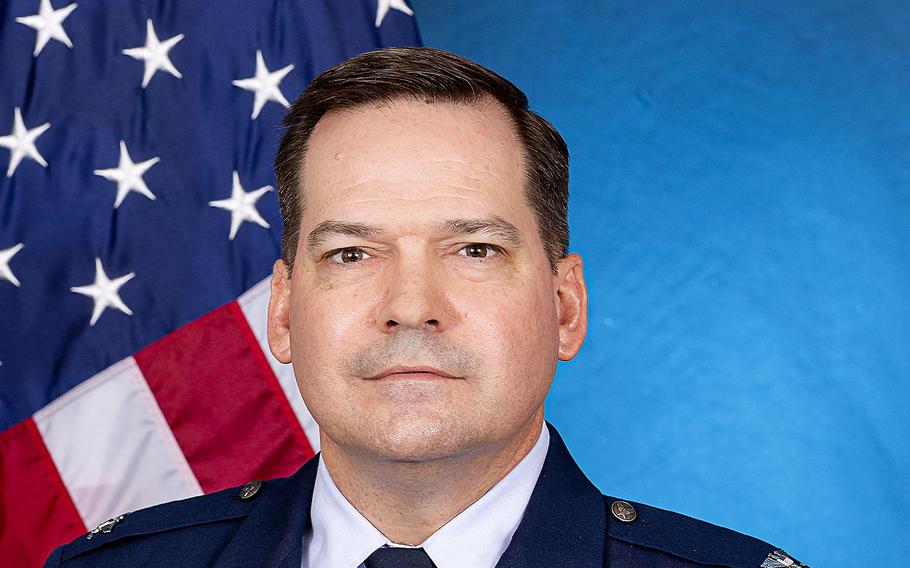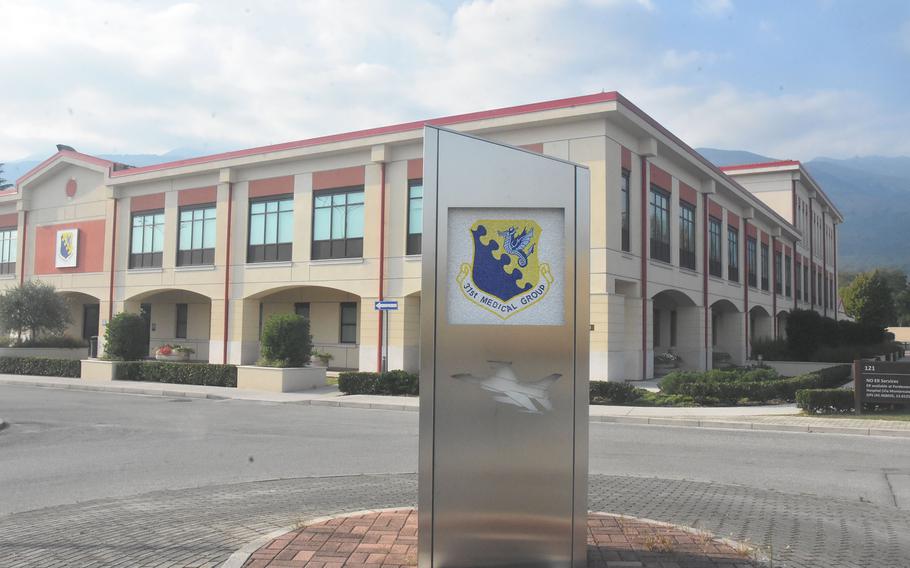
Air Force Col. Jeffrey Fewell is commander of the 31st Medical Group at Aviano Air Base, Italy. In a briefing with teachers on Sept. 12, 2023, Fewell spoke about a policy adopted 11 days earlier that halts treatment of paying patients at the base clinic. (U.S. Air Force)
AVIANO AIR BASE, Italy — The clinic at the largest Air Force community in Italy is no longer treating Defense Department civilians, their families and others who once paid for their own medical care, citing a lack of money and staff.
The decision has some military employees worried that they won’t be able to receive equivalent care at off-base Italian facilities, where fluent English isn’t a given and some prescriptions may not be available.
Col. Jeffrey Fewell, commander of the 31st Medical Group, made the announcement Tuesday to about two dozen Department of Defense Education Activity teachers.
“We have to prioritize our resources to our active-duty and Tricare enrollees,” he said during a briefing on the policy, which was adopted Sept. 1.
Active-duty service members receive free health care, while their families, which are covered by Tricare, pay significantly lower costs than many Americans.
Most DOD civilians are typically covered by large private insurance companies, which pay a varying percentage of costs minus any copayments. But not all the money those patients pay for their care goes back to the Aviano clinic, base officials said.
A similar move to restrict on-base civilian health care sparked a furor last year in Japan, where many said in base forums that they had difficulty scheduling appointments with Japanese doctors.
In March, the Defense Health Agency partially reversed the move by allowing civilians with chronic conditions like diabetes to see care on base in Japan, but only on a space-available basis.
Just how many people the new policy at Aviano will affect is unknown.
Base officials generally know the number of civilians employed there, 31st Fighter Wing spokesman 1st Lt. Steve Garrett said Tuesday. But factors such as family size, veteran status and the nature of their sponsorship aren’t as easy to determine.
A recent review of a seven-month period found that about 19% of slots in the Aviano Family Health Clinic had been devoted to paying patients.
Fewell said the new policy affects a small percentage of people at Aviano, which has an active-duty population of about 4,600 airmen and soldiers and an equal number of their dependents.

Americans not sponsored by active-duty or retired military personnel at Aviano Air Base, Italy, are now largely barred from making appointments at the clinic run by the 31st Medical Group. (Kent Harris/Stars and Stripes)
Those attending the briefing Tuesday expressed frustration at being notified of the change only after the policy had gone into effect.
Some worried about expiring medications and a few mentioned specific drugs that are either unavailable or prohibited in Italy.
Jeff England, a fifth grade teacher who’s been at Aviano for 20 years, was among them. England and his wife, Rene Alexander, have a 20-year-old son who has been prescribed Concerta by the base for almost a decade.
Italian doctors cannot prescribe that drug and similar ones such as Adderall.
Others talked about increased costs or a language barrier with physicians. And some said that even Italian speakers have trouble getting an appointment if they’re not citizens.
“We have seen Italian doctors,” Alexander said. “But I also speak Italian fluently. It took me 10 years to find doctors for my kids. New families here? They’re just not going to be able to do that.”
Fewell said he understood those concerns and that his team will do its best to help on a case-by-case basis.
“It’s not my intent to push anybody out,” he said. “But I do have to prioritize my resources. And I don’t have the resources that I once had. And that’s just a fact.”
Fewell also told the group of teachers that access to the pharmacy will be shut off Sept. 23 through Jan. 1.
That’s primarily because the base will be implementing MHS Genesis, a new computer system designed to consolidate electronic records for service members that military facilities worldwide are adopting.
Fewell expects a steep learning curve at his clinic, so the number of available care spots will be reduced for all patients during that time.
“I think it’s very, very likely that we’re going to be able to turn the pharmacy back on (for paying patients) at some point,” he said.
Told by England that many Italian doctors are required to handle large caseloads and that making appointments can be difficult for non-Italians, Fewell acknowledged unfamiliarity with the domestic health care system.
“We have some homework to do on that,” he said.
The clinic does employ Italian liaisons to engage with a network of local providers, but they don’t help those considered “pay patients,” including DOD civilians and family members.
The clinic makes approximately 6,000 off-base referrals for its Tricare population annually, as it employs almost no specialists.
The number of medical personnel on base has dropped dramatically since the Defense Department downgraded numerous military hospitals to clinics in 2017.
The Aviano family clinic has two general care doctors and two pediatricians assigned to it.
Not long after the hospital became a clinic, the base announced it would restrict pay patients’ access.
But that directive largely didn’t apply to school-age dependents, and some pay patients could still book appointments.
England and Alexander said the change reflects a deeper divide between services available to service members and their families, and others affiliated with the military.
“It just kind of reinforces the second-class citizen sentiment,” England said.